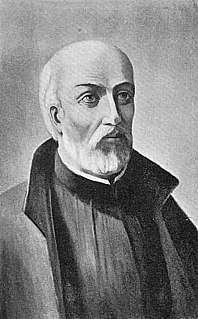
Jean de Brébeuf was a French Jesuit missionary who travelled to New France (Canada) in 1625. There he worked primarily with the Huron for the rest of his life, except for a few years in France from 1629 to 1633. He learned their language and culture, writing extensively about each to aid other missionaries.

The Mohawk people are the most easterly section of the Haudenosaunee, or Iroquois Confederacy. They are an Iroquoian-speaking Indigenous people of North America, with communities in southeastern Canada and northern New York State, primarily around Lake Ontario and the St. Lawrence River. As one of the five original members of the Iroquois League, the Kanienʼkehá꞉ka are known as the Keepers of the Eastern Door – the traditional guardians of the Iroquois Confederation against invasions from the east.

Kateri Tekakwitha, given the name Tekakwitha, baptized as Catherine and informally known as Lily of the Mohawks, is a Catholic saint and virgin who was an Algonquin–Mohawk. Born in the Mohawk village of Ossernenon, on the south side of the Mohawk River in present-day New York State, she contracted smallpox in an epidemic; her family died and her face was scarred. She converted to Catholicism at age nineteen, when she was baptized and given the Christian name Kateri in honor of Catherine of Siena. Refusing to marry, she left her village and moved for the remaining five years of her life to the Jesuit mission village of Kahnawake, south of Montreal on the St. Lawrence River in New France, now Canada.

The Painted Bird is a 1965 novel by Jerzy Kosiński that describes World War II as seen by a boy, considered a "Gypsy or Jewish stray," wandering about small villages scattered around an unspecified country in Central and Eastern Europe. The story was originally described by Kosiński as autobiographical, but upon its publication by Houghton Mifflin he announced that it was a purely fictional account.
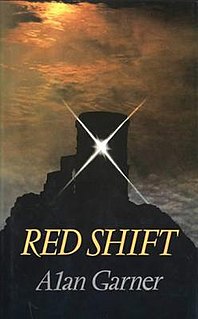
Red Shift is a 1973 fantasy novel by Alan Garner. It is set in Cheshire, England, in three time periods: Roman Britain, the English Civil War and the present.

The Susquehannock people, also called the Conestoga by some English settlers, were Iroquoian Native Americans who lived in areas adjacent to the Susquehanna River and its tributaries, ranging from its upper reaches in the southern part of what is now New York, through eastern and central Pennsylvania west of the Poconos and the upper Delaware River, with lands extending beyond the mouth of the Susquehanna in Maryland along the west bank of the Potomac at the north end of the Chesapeake Bay.
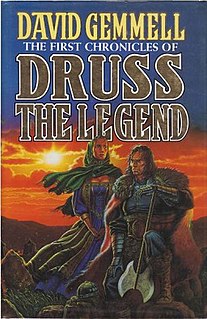
The First Chronicles of Druss the Legend is a fantasy novel by British author David Gemmell, first published in 1993. The novel is a prequel to the popular title Legend. The novel details the early life and events of the character Druss, it is followed by The Legend of Deathwalker, which deals with later events in his life between this book and the events in "Legend".
"The Vale of Lost Women" is a fantasy short story by American author Robert E. Howard. It is one of his original short stories about Conan the Cimmerian that was not published during his lifetime. The Magazine of Horror first published the story in its Spring, 1967 issue. It was republished in the collection Conan of Cimmeria. It has also been republished in the collections The Conan Chronicles Volume 1: The People of the Black Circle and Conan of Cimmeria: Volume One (1932-1933). Set in the pseudo-historical Hyborian Age, "The Vale of Lost Women" details Conan's rescue of a female Ophirean captive from the Bakalah tribe, on the (apparent) condition that he will receive sexual favors in return for his generosity.

Zorro is a 2005 novel by Chilean author Isabel Allende. Its subject is the pulp hero Diego de la Vega, better known as El Zorro, who was featured in an early 20th-century novel.

Joseph Boyden is a Canadian novelist and short story writer of Irish and Scottish descent. He also claims Indigenous descent, but this is widely disputed. Boyden is best known for writing about First Nations culture. Three Day Road, a novel about two Cree soldiers serving in the Canadian military during World War I, was inspired by Ojibwa Francis Pegahmagabow, the legendary First World War sniper. Boyden's second novel, Through Black Spruce, follows the story of Will, son of one of the characters in Three Day Road. The third novel in the Bird family trilogy was published in 2013 as The Orenda.
The Chosen Eight are members of a fictional tribe of elves on the World of Two Moons in the comic book Elfquest, created by Wendy and Richard Pini.

Heaven’s Net is Wide is a prequel to Lian Hearn's popular Tales of the Otori series. It recounts the life of Lord Shigeru from the age of 12. It begins with the murder of Kikuta Isamu, Takeo's father, and includes Shigeru's training with Matsuda Shingen, the battle of Yaegahara, the role of Muto Shizuka, the meeting with Lady Maruyama, and other events foreshadowing Across the Nightingale Floor. It concludes with Shigeru and Takeo's meeting which begins the series.
"Drums of Tombalku" is an American fantasy short story, one of the original ones written in the 1930s by Robert E. Howard featuring Conan the Cimmerian. Howard left it as an untitled synopsis which was not published in his lifetime. The tale was finalized by L. Sprague de Camp and in this form first published in the collection Conan the Adventurer (1966). It has first been published in its original form in the collection The Pool of the Black One and later in The Conan Chronicles Volume 1: The People of the Black Circle and Conan of Cimmeria: Volume Two (1934).

Jungle Tales of Tarzan is a collection of twelve loosely connected short stories by American writer Edgar Rice Burroughs, comprising the sixth book in order of publication in his series of twenty-four books about the title character Tarzan. Chronologically the events recounted in it occur within Chapter 11 of the first Tarzan novel, Tarzan of the Apes, between Tarzan's avenging of his ape foster mother's death and his becoming leader of his ape tribe. The stories ran monthly in Blue Book magazine, September 1916 through August 1917 before book publication in 1919.
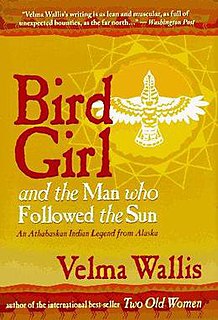
Bird Girl and the Man Who Followed the Sun is a 1996 novel by Velma Wallis. It describes the lives of two Gwich'in Athabaskans, Daagoo and Bird Girl, who each defy the rules of their culture and strike out on their own.

The Iroquois or Haudenosaunee are an Iroquoian indigenous confederacy in northeast North America. They were known during the colonial years to the French as the Iroquois League, and later as the Iroquois Confederacy. The English called them the Five Nations, comprising the Mohawk, Oneida, Onondaga, Cayuga, and Seneca. After 1722, the Iroquoian-speaking Tuscarora people from the southeast were accepted into the confederacy, which became known as the Six Nations.

Asura is a 2012 Japanese anime film directed by Keiichi Sato and based on a manga of the same name by George Akiyama. The dark drama of Asura follows the struggles of a child during a famine in medieval Japan who is abandoned by his starving and impoverished mother. Asura tied for the Audience Award for Best Animated Feature at the 16th Fantasia International Film Festival in Montreal.

The Round House is a novel by the American writer Louise Erdrich first published on October 2, 2012 by HarperCollins. The Round House is Erdrich's 14th novel and is part of her "justice trilogy" of novels, which includes The Plague of Doves released in 2008 and LaRose in 2016. The Round House follows the story of Joe Coutts, a 13-year-old boy who is frustrated with the poor investigation into his mother's gruesome attack and sets out to find his mother's attacker with the help of his best friends, Cappy, Angus, and Zack. Like most of Erdrich's other works, The Round House is set on an Ojibwe reservation in North Dakota.
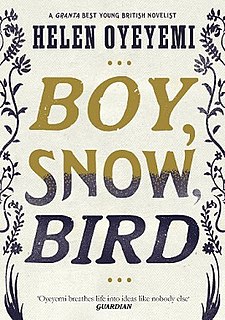
Boy, Snow, Bird is a 2014 novel by British author Helen Oyeyemi. The novel, Oyeyemi's fifth, was a loose retelling of the fairytale Snow White. Oyeyemi also cited the Nella Larsen novel Passing as an inspiration. The novel was named as one of the best books of 2014 by The New York Times, The Washington Post, NPR, and BuzzFeed.
















